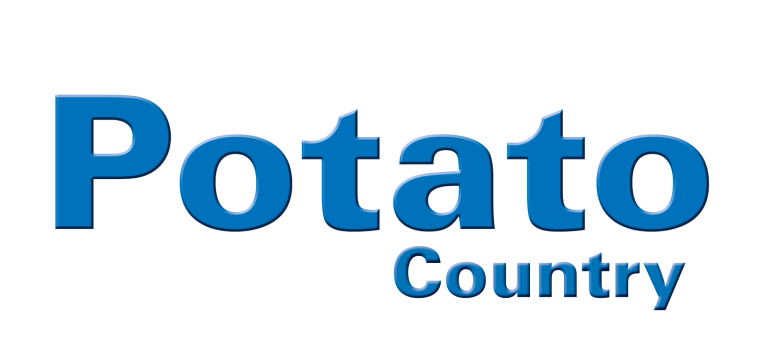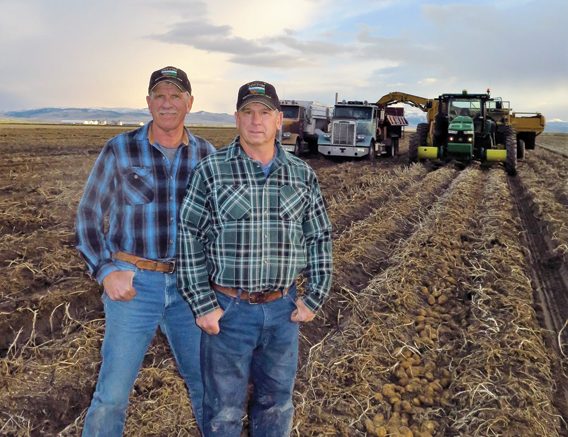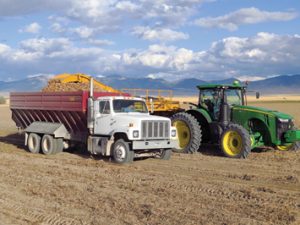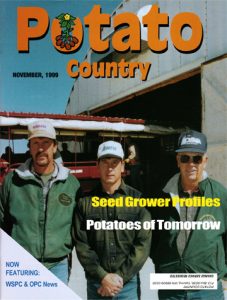Cottom Seed
Story by Denise Keller, Editor. Photos by Cottom Seed.
With a quality seed crop in storage, the Cottom family of Dillon, Montana, is chalking up a successful season to a little good fortune and a lot of careful management. Favorable weather throughout the growing season yielded consistent tuber sets ideal for seed, while tweaks to the farm’s virus management program are bringing about disease levels that are “almost non-existent,” says grower Steve Cottom.
Going the Extra Mile
Cottom Seed is a family enterprise owned by Steve and his wife, Cathy; brother David and his wife, Lesli; and their parents, Bill and Dixie. The family farms 3,000 acres, which includes alfalfa, hard red spring wheat, malt barley and 500 acres of Russet Burbank, Ranger Russet and Russet Norkotah seed potatoes. The operation starts with pre-nuclear stock and sells Generation II seed for recertification and Generation III seed to commercial growers in Washington, Oregon and Idaho.
“Because we’re a foundation seed grower and sell some seed stock for recertification, it’s very important for us to be very clean and essentially at zero for Potato Virus Y, ” Steve says.
Being fairly isolated from most potential sources of inoculum, Potato Virus Y (PVY) has been less problematic on the farm than in other growing regions, he says. Even so, the growers began taking extra precautions three years ago by planting the farm’s 1.25-acre nuclear plot within a wheat field one mile away from the other potatoes in order to prevent virus transfer from the main potato crop to the early-generation seed. Virus readings for nuclear and Generation I seed are now at zero in the summer and winter, and the higher generations are near zero, according to Steve. In addition, the growers changed the mix and sequence of chemicals used to control aphids. With these adjustments to the program, virus levels are lower than they’ve been in the last five to 10 years.
“We’re feeling good because we’re really looking good right now as far as PVY and potato disease. That’s really the crutch of our business. We live and die by our disease readings,” Steve says.
PVY management is particularly important and can be especially challenging when growing Russet Norkotah seed, of which Cottom Seed produces the Colorado 3 and Texas 278 line selections.
“The selection 3 Norkotahs were sort of a magnet for virus. They’re the ones that are really hard to keep clean,” the grower explains. “There’s typically a good market for Norkotahs if you can keep them clean because not everybody can. I guess that’s what creates the value.”
Along with fine-tuning the farm’s virus management program, the Cottoms are very particular about sanitation. They limit the number of people entering the fields by handling their own petiole sampling and rogueing. Similarly, they recently purchased a self-propelled sprayer, which reduces the potential of outside vendors introducing disease in the field. They also have a land base big enough to maintain a long rotation, planting potatoes in a particular field twice every nine years.
Lastly, the Cottoms take care to keep seed in tip-top condition as it goes into storage and at shipping time the next spring. Once harvested, potatoes are unloaded from the truck, hand-sorted as they move over the grading table, and then directly piled into storage without going through an even-flow tub or clodhopper. This minimal handling reduces bruising and Fusarium rot, according to the growers.
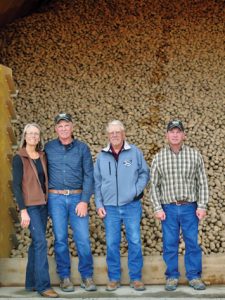
Cottom Seed is a family enterprise operated by Steve and his wife, Cathy; his brother, David; and their father, Bill. Pictured in front of freshly piled Generation III Ranger Russet seed are Cathy, Steve, Bill and David Cottom.
Four Generations and Counting
Cottom potato production in Dillon dates back to the early 1930s when Steve’s grandfather, Philip Cottom, and great-grandfather, William Irvine, came to the area to grow seed potatoes. The Cottom and Irvine families had been in the business in Leadore, Idaho, as early as 1920, but preferred the richer soils around Dillon. They were very progressive for the time, according to Steve, and within a few years they were shipping seed potatoes throughout the United States and as far as South America and New Zealand.
Steve’s father, Bill Cottom, joined the family farm in 1959. A decade later, Philip Cottom and his partners sold the operation to Skone and Connors based in Warden, Washington. Bill continued to manage the farm for Skone and Connors.
In the early 1980s, Steve and his brother, David, started farming. They gradually grew their operation and were eventually able to buy back the family’s farm from Skone and Connors in 2004 and merged it with their own farm, renaming the operation Cottom Seed Inc.
“It was really neat for my dad to see the business come full circle and back under the family’s ownership,” Steve shares.
Bill, now 80, stays busy golfing, skiing and driving tractor or truck on the farm. Steve manages the operation’s recordkeeping and marketing, and also plans and oversees the farm’s chemical and irrigation management programs. His wife, Cathy, is the office manager, while David takes the lead in shipping seed each spring and also manages the shop.
Through the years, Steve and David have implemented the latest in technology and farming practices but continue to maintain the values on which the farm was founded. From the previous generations, the brothers inherited a strong work ethic, a commitment to care for their equipment and land, as well as leadership skills, Steve says. His grandfather was the mayor of Dillon, and his dad served on the United States Potato Board (USPB) and was a director for the Montana Potato Improvement Association (MPIA). Steve has been involved with the USPB in the past and continues to serve as a director for the MPIA.
“We feel it’s important to be in tune with the industry and have our perspective represented, and we feel our input as seed growers is valuable,” he explains.
Looking ahead, the Cottoms are beginning to tackle the challenge of creating a transition plan for the farm. The next generation all have established careers, but also have a strong attachment to the family farm and a strong desire to find a way to be involved.
